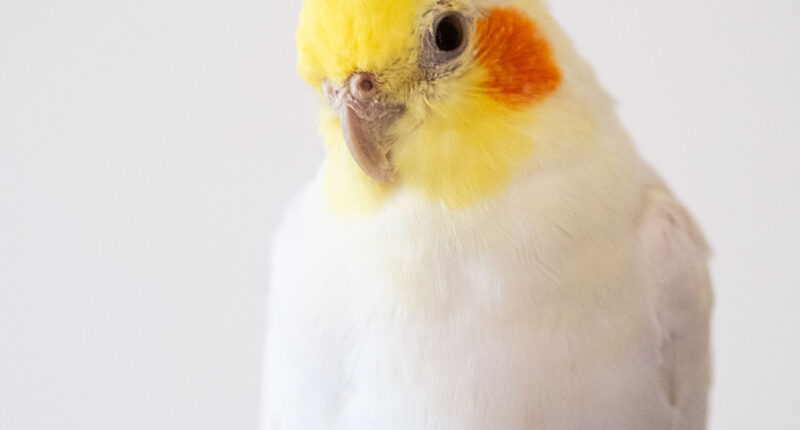HE is on a mission to help our pets . . . and is here to answer YOUR questions.
Sean, who is the head vet at tailored pet food firm tails.com, has helped with owners’ queries for ten years. He says: “If your pet is acting funny or is under the weather, or you want to know about nutrition or exercise, just ask. I can help keep pets happy and healthy.”
Q) HOW can you tell if a cockatiel is overweight? Mr Tail Feathers feels a bit plump but he doesn’t look obese?
MAGGIE O’BRIEN, Falmouth, Cornwall
Sean says: Those feathers can hide a multitude of sins, so the only way to find out is to have a feel of his chest, and that depends on him and you being comfortable with handling.
If you’re not, then it’s a good idea to get him a health check with a bird-savvy vet, as restraint and handling can be stressful.


Many caged birds are actually overweight or obese, which can lead to health problems in the long run.
Parrots, in particular, who become seed obsessed, especially with sunflower seeds, are often worst affected.
A pelleted cockatiel diet (with plenty of fresh colourful veggies and a small amount of fruit) is far better than most commercial seed mixes from the pet shop. Harrison’s is the bird food brand I recommend, and no, I’m not on commission.
Q) WE are off on holiday soon but I’ve read online about potential risks to animals of Seasonal Canine Illness and Alabama Rot from forest environments.
Most read in Money
My Labrador Ruby has had chemo for a tumour so her immunity isn’t great. Is it safe to take her with us?
ALBY BROWN, Manchester
Sean says: On balance, yes it is safe. Although Alabama Rot is alarming and very serious, there have only been 292 cases in the UK — compared with 12.5 million dogs here.
And many dogs spend time in forest environments every of the year without any problems.
You would be extremely unlucky for your dog to contract it.
Seasonal Canine Illness is also extremely rare so, on balance, I’d say the benefits of taking Ruby on holiday far outweigh the risks.
Got a question for Sean?
Q) I REGULARLY worm my dogs and cat. Do I need to worm my rabbits Bill and Bob too?
SHAUN EDGE, Blackburn
Sean says: Great question! The jury is out on whether to routinely worm rabbits. Advice varies depending on what type of worms you are targeting and whether you are worming as prevention or treatment.
It was advised to worm your rabbits every three to six months if they feed or play outdoors near where wild rabbits live. They can pick up some worms, mainly pinworms, from contaminated grass in that case.
The main parasite of concern in rabbits is called Encephalitozoon cuniculi or E.cuniculi for short.
This can be present in many rabbits without symptoms, but can cause other rabbits to become ill with neurological symptoms and even be fatal.
So the old advice of treating this every 3-6 months is being phased out, and now we tend to treat symptomatically if it causes problems for 28 days with a specific drug.
Q) MY dog Barnaby eats his own poop. It’s disgusting. How can I get him to stop?
KEN GREENAWAY, Liskeard, Cornwall
Sean says: Poo eating, or more accurately coprophagia, is actually a relatively normal behaviour for dogs.
Why? Because when they started hanging around our settlements when we became farming people rather than hunter gatherers, they ate what they could.
Often that included nutrients from dumped food leftovers, and quite literally from our dumps and toilet or latrine sites.
Fast forward and there are various tricks to discourage it. Apparently feeding your dog pineapple can make it taste (more) unpleasant.
Star of the week
INNOVATIVE light therapy has helped Rottweiler RubyLu walk again.
Mione Morrison, of Glendrick Roost Sanctuary in Aberfoyle, Perthshire, rescued RubyLu five years ago.
The pooch had cancer and no one wanted her.
Last September the 12-year-old dog suffered sudden onset paralysis.
She has been cured by Photizo Vetcare which uses red and near-infrared light to promote healing alongside physio and traditional treatment.
Mione said: “After eight weeks, I walked RubyLu, albeit slowly, into our physio session.
“RubyLu’s recovery astounds our vet.”
WIN: PET DESIGNCARPET WASHER

VAX is offering one reader the chance to win a Platinum SmartWash Pet-Design carpet washer, worth £349.
Designed for homes that endure extra wear and tear from pets or bringing up a family, it kills over 99 per cent of bacteria.
To enter, send an email headed VAX to [email protected] by June 18.
For product information see vax.co.uk/vax-smartwash-pet-design. T&Cs apply.
Bed-sharing pets are nookie no-no
HAVING pets share their bed is hampering our sex lives, a survey has revealed.
Nearly a million UK adults (832,557) admit to using their pet snoozing on the bed as an excuse not to romp. Others don’t like to wake their pet so postpone nookie.
The research by luxury British pet brand lordsandlabradors.co.uk explored the sleeping habits of the nation’s pets – and the impact on owners. Four in ten people said allowing their furry friends to sleep on the bed has affected their sex life.
One in nine admitted feeling too guilty to move their four-legged friend.
And 23 per cent will only have sex if their pet is shooed somewhere it can’t see them doing the deed.
Johanna Buitelaar- Warden, founder of Lords and Labradors, said: “Setting clear boundaries in the bedroom, namely in regard to where your pet sleeps, can be hugely beneficial to the relationship you have with your other half.
“Firstly, create a cosy place for them to sleep that they know belongs to them.
“This is followed by setting and practising clear commands such as ‘go to bed’ or ‘on your bed’, which can help both of you to get into a good routine.”












